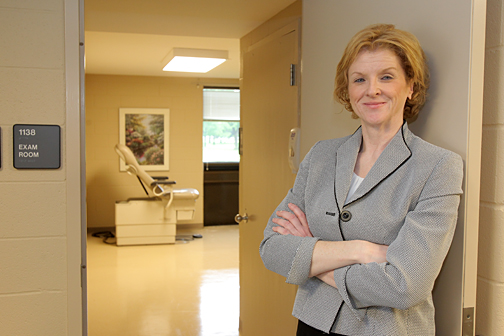Adolescents and adults with autism spectrum disorders now have a new place to receive innovative services in northwest Ohio.

Sherry Moyer stood outside the new exam room for the Adolescent Girl’s and Women’s Wellness Initiative, which is part of the Center for Excellence in Autism.
“The Center for Excellence in Autism is unique in that it serves the needs of adolescents and adults across the lifespan by facilitating maximum potential for personal growth and quality of life,” said Sherry Moyer, executive and research director of the center. “While there is a growing number of services for children with autism, there is a gap when those children become adolescents and adults. Even though the need for care does not lessen over time, the services do. We are filling that gap.”
The Adolescent Girl’s and Women’s Wellness Initiative is the first of its kind to provide comprehensive medical, social and behavioral programs and services for girls and women with autism spectrum disorders. This also will include responsible education regarding healthy sexuality development, gynecological care, abuse detection and prevention, and development of a positive self-image. The initiative is gaining national attention for the emphasis on this underserved population.
Another immediate focus of the Center for Excellence in Autism will be the Juvenile/Criminal Justice Initiative that works to develop realistic expectations and skills such as problem solving and regulating behavior. “Our goal is to reduce the number of youths in the system by empowering them to respond to a crisis situation or conflict in a positive way, while at the same time also empowering the community to come with alternatives that would really help young people who have autism or a mental health disorder,” said Dr. Morris Jenkins, UT associate professor of criminal justice and chair of the Department of Criminal Justice and Social Work.
The center also will provide outpatient services, including diagnostic assessment to evaluate an individual’s strengths and challenges in all areas of development — self-help, motor, communication, social and vocational skills. Ongoing evaluation and development of individualized service plans and individual and group counseling are other key program components.
Global Skills University is another critical initiative, which is an innovative program that features intensely focused classes for adolescents and young adults ages 10 to 25 in the areas of self-regulation of behaviors, problem-solving skills, recognition of social norms, personal hygiene and sexuality development, and organizational skills, among others. It is patterned after an academic program with participants advancing through a series of courses choosing electives to graduate.
The University is one of the few centers in the country that offers the Integrated Self-Advocacy ISA® Curriculum through a certified trainer. The program helps people with autism spectrum disorders become their own advocates by assisting them with self-awareness, competency and autonomy in key areas at school, home, work and in the community. It focuses on the five skill areas of sensory advocacy, social advocacy, understanding focused interests and strengths, navigating self-disclosure, and knowing one’s civil rights and entitlements.
“Advocating for yourself plays a role in nearly every aspect of life, and just like learning social ability, our friends and loved ones on the spectrum have better outcomes and improved quality of life if we take the time to teach them how to do it well,” said Dr. Valerie Paradiz, who developed the Integrated Self-Advocacy ISA® Curriculum.
Embracing the University’s mission and values, the center also will have opportunities for internships and graduate research assistantships to further students’ learning and professional development.
The center works with local, state and national partners in the autism community to expand resources and enhance services.
For additional information, contact the center at 419.383.3030 or autisminfo@utoledo.edu.